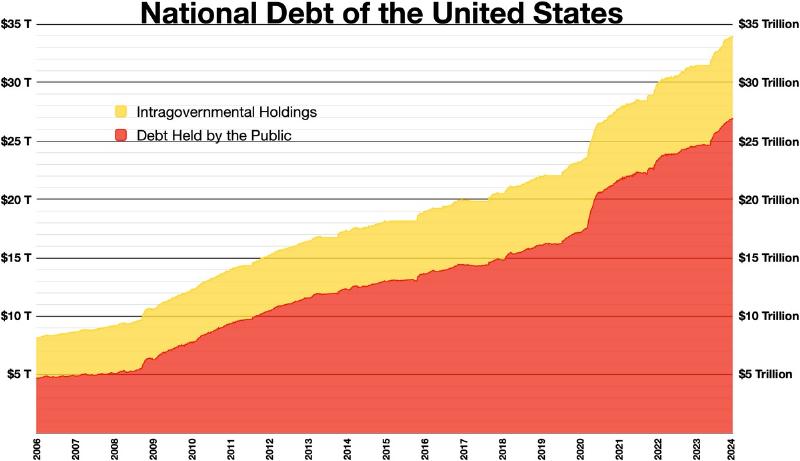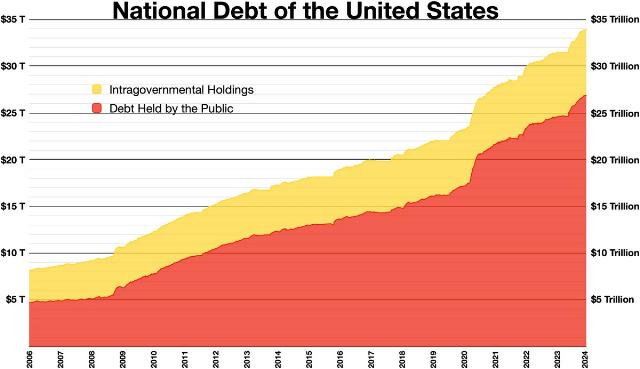


As the debate over the “big, beautiful” budget reconciliation bill indicates, massive forces are aligned against any serious attempt to cut the federal budget deficit and give the U.S. economy a fighting chance to generate enough revenue to meet a sensibly reduced slate of federal government ambitions.
Even the U.S. economy, the best in the world, cannot support the current and upcoming federal debt. Unfortunately, political realities make a rescue exceedingly unlikely.
The problem is that there cannot be any bipartisan deal to prevent a catastrophic debt spiral, which will arrive within the next decade unless we begin to arrest it now through serious spending cuts. The opposition party does not benefit if the president and his party solve national problems, including existential ones such as this. Any attempt to cut spending does them no good and would probably cost them politically.
The opposition party also believes in Modern Monetary Theory, which argues that the U.S. government can spend as much as it wants without harming the economy, because it has the power to print as much money as it takes to cover any deficit (which it must do to avert an open repudiation of debt). If that sounds like a recipe for inflation and ultimately hyperinflation, that is because it is exactly that.
In addition, while the opposition party perceives that higher social spending benefits them politically, the majority Republicans support increases in defense spending, immigration enforcement, and the like. The great majority of the budget, however, is for social spending and debt payments.
These political considerations stymie efforts to cut spending significantly. Most Republicans probably view major spending cuts as political suicide. The opposition, including the entire media complex, would trot out every possible real or imaginary “victim” of their “draconian cuts” that “benefit the rich at the expense of hardworking middle-class Americans.”
Meanwhile, the big, beautiful bill cannot implement the necessary comprehensive reforms, because those are not possible in a reconciliation bill. Serious budget cuts would require legislation that could get past a Senate filibuster. That would require at least seven votes from the minority party, which the Republicans are not going to get.
The Republicans are certainly right about the likely political fallout of real entitlement reform, and they have convinced themselves that the fiscal situation is not as dire as the numbers show, to salve their consciences as they tinker with the silverware in the dining car while the train roars out of control down the mountain. In this way, they too are acting on their perceived political interests instead of what is good for the country, failing to do what is absolutely necessary to avert a disaster.
The Democrats’ position is decisive. If even a few were to support spending cuts, the nation and its economy could be saved. That has not happened at any point thus far, and there are no signs of that changing.
That leaves small moves such as the current recission bill, which would reduce annual federal spending by around 0.02 percent. Such a minute change would be symbolic only, yet it could mark an important moment were it to pass and embolden Republicans to make real spending cuts.
Unfortunately, the opposition and the mainstream media object even to that small attempt at sanity. It seems that this dynamic will not change until the crisis arrives. At that point, it will be too late to save the current system as President Trump is trying to do.
Entitlements are the main problem. Trump’s pledge not to touch Social Security or Medicare at present is probably workable and in fact can be seen as wise: substantial cuts to those programs would be the equivalent of a repudiation of government debt, an obligation the government took on when it began taking money from people’s paychecks and promising to pay it back at an economic return far, far below what people could gain by investing it in the private sector, and then borrowing that money to spend on current vote-buying programs.
Debt repudiation is death to a government’s credibility and makes borrowing even more expensive. Trump is right to keep that off the table. That stricture, however, leaves an enormous amount of entitlement money in programs such as Medicaid and food stamps. Sufficient cuts there could forestall the disaster, and they could be accompanied by reductions of projected defense spending, in the name of burden-sharing. Concentrating more on directly defending U.S. soil and dialing down power-projection in other countries is certainly a reasonable course when facing a possibly extinction-level fiscal crisis.
However, even talking about eliminating only the most blatant fraud and waste in Medicaid, food stamps, and other such income-transfer programs carries the threat of political doom for any who dare suggest it. Real reform would require a level of courage and integrity highly uncommon among members of Congress.
These political tides make a sensible and peaceful resolution to the nation’s fiscal problems extremely unlikely.
S.T. Karnick is a senior fellow at The Heartland Institute and author of the Life, Liberty, Property weekly e-newsletter.

Image: Wikideas
